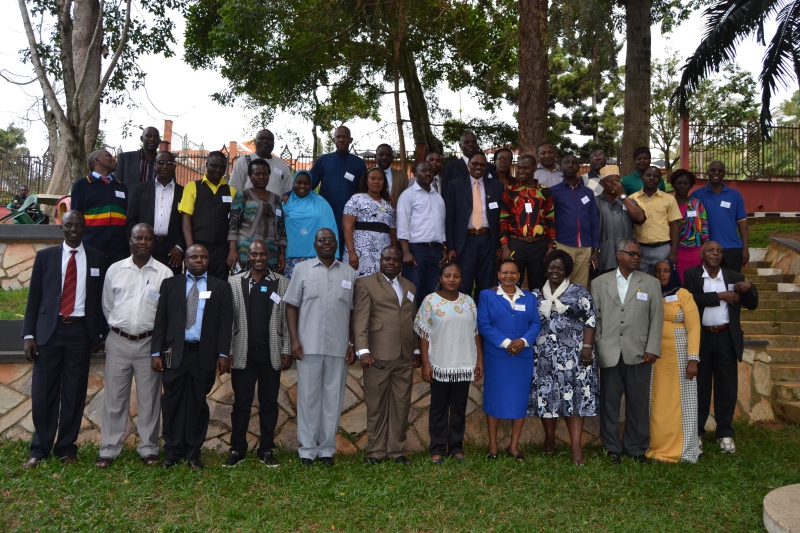
East African Kiswahili Commission Discusses Strategy Implementation Plan
East African Kiswahili Commission; Zanzibar, Tanzania; 20 March 2017:
From the 15th-17th March 2017, the East African Kiswahili Commission (EAKC) convened a three-day strategy implementation forum at the Imperial Botanical Beach Hotel, in Entebbe, Uganda.
The meeting brought together stakeholders from EAC Partner States, Kiswahili Associations and the Media to build a common understanding and shared ownership and to facilitate a consensus on the implementation approach to the Commission’s Strategic Plan (2017-2022).
The forum articulated a sequence of investments and activities needed to achieve the mandate of coordinating and promoting the development and use of Kiswahili in regional integration and sustainable development of the East African Community.
Explaining the framework and soliciting their reaction and opinion, the Executive Secretary of the Commission Prof. Kenneth Simala informed participants that road-mapping is considered good planning for successful implementation of the Commission’s strategy.
The forum was, therefore, seen as the beginning of what will be an interactive, collaborative and participatory process between the stakeholders and the management in the implementation of the Strategic Plan for the next five years.
Prof. Simala said that the stakeholders and development partners will have to consider many variables that include a majority agreeing on specific approach to be used in order to realize the intended objectives.
He further challenged the stakeholders to be ready and willing to invest financial and human resources in the implementation of the plan. He thanked Kiswahili stakeholders, more so the EAC Partner States, for taking various practical initiatives to ensure that Kiswahili is developed and used in the service of the Community.
The Commission presented for discussion three priority areas in the roadmap to the implementation plan: Institutional Capacity Assessment of the development and use of Kiswahili in the EAC; EAKC Mobility Policy and Programme; and the production and dissemination of Kiswahili knowledge in the EAC and beyond.
The meeting was informed that the need for the assessment of the development and use of Kiswahili in various institutions in the Community can never be more urgent. The assessment is a prerequisite for understanding capacity development needs imperative in the implementation of the Commission Plan.
Participants discussed and approved a draft Capacity Assessment Manual and Guide developed by the Commission and which will be used in the planned exercise that will culminate in a capacity assessment report showing the status of Kiswahili development and use in various institutions across EAC Partner States.
The stakeholders acknowledged that whereas there has been a phenomenal growth and complexity of the number of institutions involved in the development and use of Kiswahili in the EAC and beyond, there are enormous challenges confronting them and which impact on their roles and effectiveness. There is need, therefore, for Kiswahili stakeholders in the Community to work together amongst themselves and with others elsewhere in the world in order to strengthen joint action to address these and other emerging issues.
The meeting was informed that the Commission had identified mobility as a major pillar of its strategy for dealing with these challenges. Mobility is considered an important element of the mission of the Commission of promoting and coordinating the development and use of Kiswahili for regional integration and sustainable development in the Community. It is for this reason that the Commission is investing in a Mobility Policy and Programme as a framework of strategic partnerships and strong and broad cooperation and as a tool to provide opportunities for Kiswahili stakeholders to interact. The forum approved both the policy and programme developed by the Commission.
The Commission reaffirmed its commitment to provide high quality research driven policy advice to Kiswahili stakeholders, especially Partner States governments. While aiming to be a truly international institution that is firmly rooted in the Community and working closely with Partner States governments, business, society and the public, the Commission intends to play an active role in the integration process and sustainable development agenda as an innovative knowledge institution. Hence, knowledge production and dissemination is crucial to the implementation roadmap.
It is within this context that this year’s first EAKC Conference in Zanzibar, on 6th-8th September marks what promises to be a feature of the Commission’s outreach programme. Themed ‘The Role of Kiswahili in the Transformation of the East African Community’, the Conference has attracted participants from various sectors of society who will critically examine Kiswahili as a resource and tool necessary for the attainment of Sustainable Development Goals. The deadline for receiving abstracts was extended to 31st March, 2017 so as to allow more stakeholders to participate.
- ENDS -
For more information, please contact:
Executive Secretary
East African Kiswahili Commission;
Tel: +255 242 232 704;
email: isimala [at] eachq.org
About the East African Kiswahili Commission:
The East African Kiswahili Commission (EACK) is an institution of the East African Community based in Zanzibar, The United Republic of Tanzania. The Commission started its operations in May, 2015 and has developed the Annual Operations Plan for 2016-2017. The Commission’s vision is to be the leading body in the promotion and coordination of the development and usage of Kiswahili for regional integration and sustainable development.
